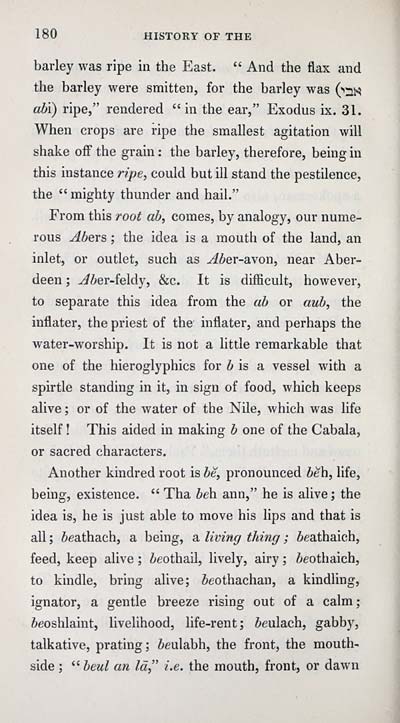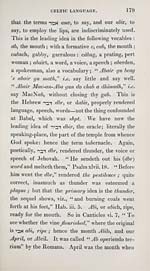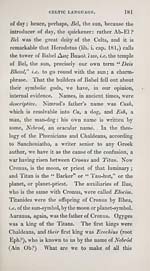Download files
Complete book:
Individual page:
Thumbnail gallery: Grid view | List view

180 HISTORY OF THE
barley was ripe in the East. " And tiie flax and
the barley were smitten, for the barley was (^i^s
ab\) ripe," rendered " in the ear," Exodus ix. 31.
When crops are ripe the smallest agitation wiU
shake ofF the grain : the barley, therefore, being in
this instance ripe, could but ill stand the pestilence,
the " mighty thunder and hail."
From this root ab, comes, by analogy, our nume-
rous Abers ; the idea is a mouth of the land, an
inlet, or outlet, such as ^èer-avon, near Aber-
deen ; ^òer-feldy, &c. It is difficult, however,
to separate this idea from the ab or aub, the
inflater, the priest of the inflater, and perhaps the
water-worship. It is not a Uttle remarkable that
one of the hieroglyphics for 6 is a vessel with a
spirtle standing in it, in sign of food, which keeps
alive ; or of the water of the Nile, which was life
itself ! This aided in making b one of the Cabala,
or sacred characters.
Another kindred root is bt, pronounced bè\\, life,
being, existence. " Tha be\v ann," he is aUve ; the
idea is, he is just able to move his Hps and that is
all ; èeathach, a being, a living thing ; èeathaich,
feed, keep alive ; Z/eothail, lively, airy ; èeothaich,
to kindle, bring alive; èeothachan, a kindUng,
ignator, a gentle breeze rising out of a calm;
èeoshlaint, livehhood, life-rent; èeulach, gabby,
talkative, prating; èeulabh, the front, the mouth-
side ; " beul an là," i.e. the mouth, front, or dawn
barley was ripe in the East. " And tiie flax and
the barley were smitten, for the barley was (^i^s
ab\) ripe," rendered " in the ear," Exodus ix. 31.
When crops are ripe the smallest agitation wiU
shake ofF the grain : the barley, therefore, being in
this instance ripe, could but ill stand the pestilence,
the " mighty thunder and hail."
From this root ab, comes, by analogy, our nume-
rous Abers ; the idea is a mouth of the land, an
inlet, or outlet, such as ^èer-avon, near Aber-
deen ; ^òer-feldy, &c. It is difficult, however,
to separate this idea from the ab or aub, the
inflater, the priest of the inflater, and perhaps the
water-worship. It is not a Uttle remarkable that
one of the hieroglyphics for 6 is a vessel with a
spirtle standing in it, in sign of food, which keeps
alive ; or of the water of the Nile, which was life
itself ! This aided in making b one of the Cabala,
or sacred characters.
Another kindred root is bt, pronounced bè\\, life,
being, existence. " Tha be\v ann," he is aUve ; the
idea is, he is just able to move his Hps and that is
all ; èeathach, a being, a living thing ; èeathaich,
feed, keep alive ; Z/eothail, lively, airy ; èeothaich,
to kindle, bring alive; èeothachan, a kindUng,
ignator, a gentle breeze rising out of a calm;
èeoshlaint, livehhood, life-rent; èeulach, gabby,
talkative, prating; èeulabh, the front, the mouth-
side ; " beul an là," i.e. the mouth, front, or dawn
Set display mode to: Large image | Transcription
Images and transcriptions on this page, including medium image downloads, may be used under the Creative Commons Attribution 4.0 International Licence unless otherwise stated. ![]()
| Early Gaelic Book Collections > Hew Morrison Collection > Adhamh agus Eubh, no Craobh Sheanachais nan Gàël > (310) |
|---|
| Permanent URL | https://digital.nls.uk/76900452 |
|---|
| Description | A selection of items from a collection of 320 volumes and 30 pamphlets of literary and religious works in Scottish Gaelic. From the personal library of Hew Morrison, the first City Librarian of Edinburgh. |
|---|
| Description | Selected items from five 'Special and Named Printed Collections'. Includes books in Gaelic and other Celtic languages, works about the Gaels, their languages, literature, culture and history. |
|---|

